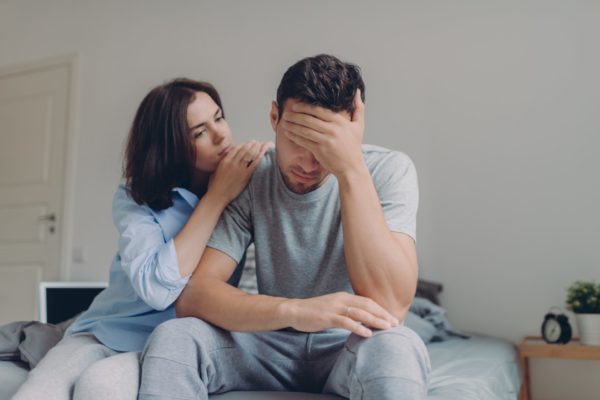Depression Definition

The main two symptoms of depression are:
- A sensation of feeling sad most of the time
- Loss of interest in activities that used to be enjoyable.
In addition to one or both of these symptoms those with depression will also be affected by most of the following symptoms:
- Disrupted or disturbed sleep
- Reduced appetite and/or weight
- A loss of energy or feeling more fatigued
- Feeling agitated or sluggish
- Finding it hard to concentrate or make decisions
- Thoughts about suicide or hurting yourself
A diagnosis of depression is made when a person has five or more of these symptoms, and a doctor is satisfied that the symptoms aren’t being caused by anything else.
What Causes Depression?
Whilst the exact cause of depression is unknown, it is thought to be affected by an underlying risk factor. This could be due to specific changes in brain signalling and function that people are born with, or they develop later in life that increases the likelihood of them developing depression. Commonly the development of depression is triggered by a life event or childhood trauma, for some, there may be no obvious external cause. Finally there may be factors such as housing, personal finances, or social circumstances that affect the likelihood of developing or maintaining a state of depression.
Depression Conditions
Clinical depression is sometimes referred to as major depressive disorder.
Major depressive disorder comes in many forms with varying symptoms and treatment options. For all individuals with depression, it is important to implement changes in their lifestyle, if possible, to ensure that their physical and mental health is receiving adequate attention This will be different for every person, as for some it might be that they need to eat a balanced diet, whilst for others getting more exercise may be beneficial, or indeed receiving support with housing and financial support is what is required. Most people with depression who see a doctor will be offered talking therapies. Whilst these may not work for everybody they can be helpful in developing strategies to deal with the experience of low mood. For other individuals prescription medication may be necessary. Medical cannabis may be considered for depression if individuals have failed to achieve sufficient benefit from first line licensed therapies.
Many people may benefit from receiving support from mental health charities, such as Mind UK.
In addition, it is important to where you can get help for a mental health crisis or emergency. If you or someone else is in danger, you should call 999 or got to A&E urgently. In England, local urgent mental health helplines are available.
The Samaritans also provide a confidential support line by trained volunteers that anybody can call at any time.
Persistent Depressive Disorder
Persistent depressive disorder was previously referred to as dysthymia. For a diagnosis of persistent depressive disorder an individual must have persistent depressive symptoms for 2 years or greater, with at least 2 of the following additional symptoms:
- Poor appetite or overeating
- Insomnia or hypersomnia
- Low energy/fatigue
- Low self-esteem
- Poor concentration/decision making
- Hopelessness
Bipolar Disorder
Bipolar disorder is characterised by episodes of extreme highs and lows. While most of us will experience ups and downs in our moods, for those with bipolar disorder, your mood swings are much more extreme and disrupt your daily life. At times, those with bipolar disorder will feel very high and have lots of energy, which is called mania. At other times, they may experience periods of depression. As such, the condition used to be called manic depression.
Seasonal Affective Disorder
Seasonal Affective Disorder, also known as SAD, is a form of depression brought on by a change in the seasons. Symptoms subside in the spring and summer months, but winter can be a very challenging time for sufferers of SAD. In addition to the therapies for depression listed above, light therapy, which helps some individuals with their mood, uses special light boxes that mimic the sun’s rays, but without the potentially harmful ultraviolet rays.
Psychotic Depression
Psychotic depression, also known as depressive psychosis, is an episode of major depressive disorder characterised by additional psychotic symptoms including:
- Hallucinations, where the sufferer sees or hears things that are not really there
- Delusions, which are a fixed belief in something that isn’t based in reality or is untrue, despite evidence to the contrary. Often these delusions are paranoid thoughts resulting in the sufferer believing people and/or institutions are out to harm them.
Postnatal Depression
The weeks and months following childbirth can prove difficult for a new parents and it can be easy to put a low mood down to hormones and lack of sleep. But if the symptoms of depression continue for longer than 2 weeks, this may be an indication of postnatal depression and the person affected should seek support from their GP and/or health visitor as appropriate. It affects a large proportion of new parents, so if you are feeling this way it is important that you don’t feel alone.
PMDD – Premenstrual Dysphoric Disorder
Premenstrual dysphoric disorder (PMDD) is a very severe form of premenstrual syndrome (PMS). The symptoms are brought on by a change in circulating hormone levels during the menstrual cycle. However, the reason why it affects some individuals and not others, is not entirely clear. The symptoms start during the second half of the menstrual cycle in the run up to a period and are the same as those experienced by those with a major depressive disorder. However, individuals may also experience typical PMS symptoms, such as bloating, fatigue, breast tenderness, and headaches. Treatment for PMDD is again similar to other depressive disorders, however a combined oral contraceptive may also be indicated for the right individual.
Treatment Resistant Depression
If several treatment options have been tried but the depression remains, it may be a case of treatment resistant depression. Those with treatment resistant depression do not respond to antidepressants or talking therapies or, their symptoms ease but this is short lived. Treatment resistant depression is extremely difficult to live with as it can add to the feelings of hopelessness that one is already experiencing.
Medicinal cannabis can only be considered when first line therapies have not achieved adequate benefit in symptoms or quality of life.
How is Depression Diagnosed?
A health professional will confirm that the sufferer has experienced five or more depression symptoms every day for most, if not every day, for at least a 2-week period. The individual will need to report either low mood or a loss of interest or pleasure in activities that would usually bring happiness to satisfy a diagnosis of depression. In addition, the doctor must be satisfied there are no other medical causes for low mood, such as endocrine abnormalities.
Depression Treatment

Treatment for depression varies from case to case. Sometimes talking therapy is all that is needed but prescription medication can be appropriate for some individuals too. Different types of depression may benefit from specific treatments; for instance, light therapy for seasonal affective disorder. It is therefore vital to see a health professional first to discuss your symptoms and any appropriate management plan.
Depression and Medicinal Cannabis
Research into the effect of medicinal cannabis on depression is limited. However, following the legalisation of cannabis for medical purposes in 2018, there has been a rise in people looking towards medical cannabis. When first-line therapies have not proved effective at reducing symptoms, medical cannabis may be considered an option for depression.
For further information and to find out more about medical cannabis, click here to discover more about our award-winning Curaleaf Access Scheme. Alternatively, complete an eligibility assessment now. Once complete, one of our clinicians will review your application and advise whether you are eligible for progression to an appointment.

